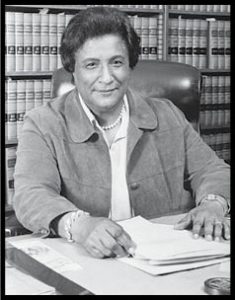PROGRAM
Roosevelt House invites you to attend a new public program presented on Zoom
Marking Black History Month
TOMIKO BROWN-NAGIN
on her new book
Civil Rights Queen: Constance Baker Motley and the Struggle for Equality
In conversation with Hunter College Professor D’Weston Haywood
Special Introductory Remarks by the son of Constance Baker Motley, Chairman Emeritus of Human Rights Watch and Longtime Roosevelt House Advisory Board Member Joel Motley

Roosevelt House is proud to present a discussion—presented on Zoom—of the new book Civil Rights Queen: Constance Baker Motley and the Struggle for Equality by Tomiko Brown-Nagin. With this monumental and timely new history, Brown-Nagin delivers the first major biography of Constance Baker Motley, one of our country’s most influential and groundbreaking judges—whose story sheds new light on the twin struggles for gender equality and civil rights in the 20th century. The author will be in conversation with Hunter College Professor of History D’Weston Haywood.
Meticulously researched and revelatory, Civil Rights Queen brings to life a figure who remade law and inspired the imaginations of African Americans across the country. Born to an aspirational blue-collar family during the Great Depression, Constance Baker Motley went on to become the first Black woman appointed to the federal judiciary—as well as the first black woman elected to the state Senate in New York, the first black woman to argue a case in front of the Supreme Court, and the first woman elected Manhattan Borough President. As an activist lawyer, and the only black woman member of the legal team at the NAACP Legal Defense and Educational Fund at the time, she defended Martin Luther King in Birmingham, helped to argue in Brown vs. The Board of Education, and played a critical role in vanquishing Jim Crow laws throughout the South.
A legal pioneer who changed the course of history, Judge Motley’s story compels readers to ponder some timeless and urgent questions: How do the historically marginalized access the corridors of power? What is the price of the ticket? And how does access to power shape individuals committed to social justice?
According to former Roosevelt House guest Annette Gordon-Reed: “Civil Rights Queen is a brilliant work, elegantly written and deeply researched. Brown-Nagin does complete justice to the life of Constance Baker Motley, one of the Twentieth Century’s towering figures.”
Tomiko Brown-Nagin is Dean of Harvard’s Radcliffe Institute for Advanced Study: the Daniel P.S. Paul Professor of Constitutional Law at Harvard Law School, and Professor of History at Harvard University. In 2019, she was appointed chair of the university’s Presidential Committee on Harvard and the Legacy of Slavery. She is a member of the American Academy of Arts and Sciences, of the American Philosophical Society, and of the American Law Institute, and a distinguished lecturer for the Organization of American Historians. Her previous book, Courage to Dissent: Atlanta and the Long History of the Civil Rights Movement, won the Bancroft Prize.
D’Weston Haywood, moderator, is Associate Professor of History at Hunter College. His work centers on Black protest and civil rights, Black intellectual history and Black political thought, and the intersections of Black culture, politics, public spheres, and the state. His work includes forays into an innovative scholarly and pedagogical praxis he calls “Sonic Scholarship”—fusing history and hip hop in projects such as “The [Ferguson] Files: A Sonic Study of Racial Violence in America” and “MADE MEN,” which examines American politics, white nationalism, and white masculinity during the Trump era. He is the author of Let Us Make Men: The Twentieth-Century Black Press and a Manly Vision for Racial Advancement.









